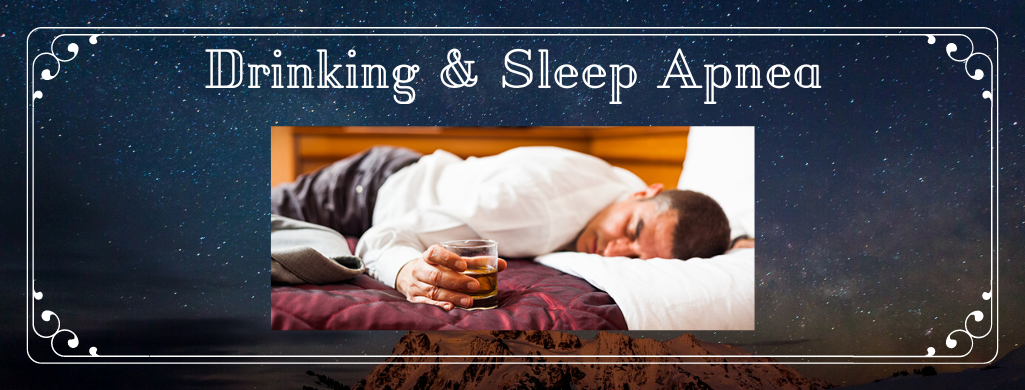Yes, drinking can cause sleep apnea due to inflammation and relaxing muscles in the throat.
Do you often find yourself drinking late at night? Or do you spend time partying with your friends and indulge in alcoholic drinks? But does that really have an impact on your sleep? More importantly, can drinking be a leading cause of sleep apnea?
Sleep apnea is a commonly known sleeping disorder in which breathing repeatedly stops during sleep. It is marked by irregular breathing, snoring and excessive daytime sleepiness. Apart from lifestyle factors like obesity or alcohol use, it is also linked to certain medical conditions such as congestive heart failure and stroke.
Research suggests that drinking can certainly increase the risk of developing sleep apnea. Studies indicate that excessive alcohol increases inflammation during sleep which causes breathing disruption as well as relaxing the muscles in your throat which can lead to snoring and blocked airways. In this article, we will look at the possible connections between drinking and sleep apnea so you can determine if it affects your sleep or not.
How does alcohol affect sleep?
Alcohol has a sedative effect that can make you feel relaxed and drowsy, which is why it is often used as a sleep aid. But while it can help you fall asleep more quickly, alcohol consumption can also have an adverse effect on your sleep quality.
Alcohol impairs the body’s ability to enter the deeper stages of sleep, meaning that even though you may drift off quicker, your overall rest and recovery is reduced. This type of disturbed sleep can lead to feeling groggy during the day and increases the risk of developing sleep apnea.
Does drinking cause sleep apnea?
Research suggests that there is a strong correlation between alcohol consumption and the development of sleep apnea. Studies have shown that alcohol can directly affect the airways in your throat, leading to obstruction and snoring. This can then lead to shallow breathing, gasping or even pauses in breathing during sleep. Heavy drinking has also been linked to a decrease in REM (rapid eye movement) sleep, which is essential for restoring mental and physical health.
Additionally, binge drinking (consuming five drinks or more at a time) can increase the risk of developing sleep apnea by up to six times compared to non-binge drinkers. Furthermore, studies suggest that alcohol use can worsen existing cases of sleep apnea. It is important to note, however, that drinking does not necessarily cause sleep apnea in all cases and the severity of symptoms will vary from person to person.
How does alcohol cause sleep apnea?
Alcohol has been linked to the development of sleep apnea in several ways. First, alcohol consumption can cause airway obstruction due to its effects on the muscles in your throat. Alcohol can relax these muscles and increase the risk of snoring and blocked airways during sleep.
In addition, alcohol can also affect your respiratory control centers, leading to shallow or labored breathing during sleep. This type of disrupted breathing is known as central sleep apnea and it is similar to what occurs in obstructive sleep apnea.
Finally, excessive alcohol use has been linked to increased inflammation throughout the body which can further contribute to breathing disruptions during sleep. All of these factors combined can lead to a decrease in overall REM sleep, which is essential for restoring energy and mental health.
Can drinking lead to sleep apnea eventually?
There is no definitive answer as to whether or not drinking leads to sleep apnea, but research does suggest that there may be a connection. People who drink heavily are more likely to suffer from sleep apnea than those who don’t.
Heavy drinkers are also more likely to experience broken sleep, which can make it harder to breathe properly and increase the risk of developing sleep apnea. So while drinking may not cause sleep apnea on its own, it can certainly increase your risk of developing it.
Should I drink or not?
The debate surrounding whether or not you should drink is an age-old one. While some people may argue that there are health benefits to moderate consumption of alcohol, it’s important to be aware that your sleep should be a priority when making this decision.
For those who suffer from obstructive sleep apnea, reducing or eliminating alcohol consumption altogether is strongly recommended. Alcohol relaxes the throat muscles even more than usual, leading to more severe breathing problems during the night and an overall poorer quality sleep.
If you don’t have any sleep issues, a couple of drinks in moderation won’t greatly affect your sleep quality; however, it is best to finish up your last drink at least two hours before bedtime so that the alcohol doesn’t still be coursing through your veins when you put your head on the pillow.
It’s important to recognize that drinking can affect everyone differently and must therefore be monitored carefully. Even if you don’t suffer from obstructive sleep apnea, heavy drinking can cause mild sleep apnea symptoms and a poor night’s rest as well as day-to-day fatigue and concentration problems due to lack of consistent good sleep. Your body needs time to rest and recover, so it is advised that you limit your alcohol intake in order to avoid any further disruption to your sleep.
Conclusion
Excessive alcohol consumption has been linked to an increased risk of developing sleep apnea. Alcohol can relax the muscles in your throat and cause airway obstruction, as well as impairing your respiratory control centers and increasing inflammation throughout your body.
Overall, research suggests that drinking can increase the risk of developing sleep apnea and worsen existing cases. It is important to be aware of how alcohol affects your sleep and take steps to reduce your consumption if you suspect it is causing problems with your sleep. If you have difficulty sleeping or are feeling excessively tired during the day, you should consult a doctor for further evaluation and treatment.


